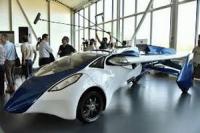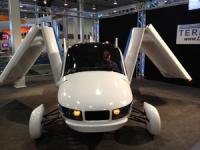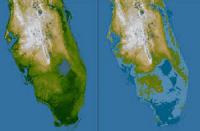-
New sensors can sense and sort troublesome gases
From astronauts and submariners to miners and rescue workers, people who operate in small, enclosed spaces need good air quality to work safely and effectively. Newly developed electronic sensors can simultaneously detect at least three critical parameters that are important to monitor to ensure human comfort and safety.
-
-
Accurately predicting harmful space weather’s “killer” electrons

A new space weather model reliably predicts space storms of high-energy particles that are harmful to many satellites and spacecraft orbiting in the Earth’s outer radiation belt. The model can accurately give a one-day warning prior to a space storm of ultra-high-speed electrons, often referred to as “killer” electrons because of the damage they can do to spacecraft such as navigation, communications, and weather monitoring satellites.
-
-
Flying cars: automating the skies means playing with our lives

Recent research suggests that flying cars could eventually be a sustainable way to free up roads. The first models are set to hit our skies in 2019 as personal playthings, while industry sees them as taxis and commuter vehicles of the future. But as Harry Potter’s encounter with the Whomping Whillow reminds us, flying cars can be dangerous. Before futuristic visions of three-dimensional sprawling city traffic can approach reality, there are some serious safety issues that need addressing.
-
-
New device creates electricity from snowfall
Researchers and colleagues have designed a new device that creates electricity from falling snow. The first of its kind, this device is inexpensive, small, thin and flexible like a sheet of plastic.
-
-
Biologically inspired network protection software
Electrical engineers look to the human immune system for clues on how to best protect digital networks. It’s a concept that’s beginning to be explored more and more by researchers in a variety of fields: What does the human body do well and how can we adapt those mechanisms to improve technology or engineering systems?
-
-
Why the Great Plains has such epic weather
From 78 degrees on Tuesday to snow on Wednesday? Swings like this aren’t unusual in the central United States, where weather can quickly shift from one extreme to another. What generates such “big weather” on the Great Plains?
-
-
Preparing San Francisco for future storms
The San Francisco Bay Area has been pummeled this winter by storms packed with moisture from atmospheric rivers. San Francisco is partnering with the Berkeley Lab to assess how climate change may influence the intensity of atmospheric rivers and associated precipitation, and how those changes may impact San Francisco and its infrastructure.
-
-
Flying colors: Assessing the role of flying cars in sustainable mobility

A new study of the environmental sustainability impacts of flying cars, formally known as electric vertical takeoff and landing aircraft, or VTOLs, finds that they wouldn’t be suitable for a short commute. However, VTOLs—which combine the convenience of vertical takeoff and landing like a helicopter with the efficient aerodynamic flight of an airplane—could play a niche role in sustainable mobility for longer trips.
-
-
Stern warning: Climate expert emphasizes the fierce urgency of now

Prominent economist and policymaker Lord Nicholas Stern delivered a strong warning about the dangers of climate change in a talk at MIT on Tuesday, calling the near future “defining” and urging a rapid overhaul of the economy to reach net zero carbon emissions. “The next 20 years will be absolutely defining,” Stern told the audience, saying they “will shape what kind of future people your age will have.”
-
-
China catching up to the U.S. in innovation
If China is only a copier, not an innovator, then the competitive threat it poses to advanced economies would be limited. But there is no reason to believe China won’t follow the path of “Asian tigers” that rapidly evolved from copiers to innovators, which poses a serious threat.
-
-
Detecting, analyzing suspicious activity in surveillance footage

Traditional surveillance cameras do not always detect suspicious activities or objects in a timely manner. Researchers developed a hybrid lightweight tracking algorithm known as Kerman (Kernelized Kalman filter).
-
-
Do armed guards prevent school shootings?
The presence of guns in schools is a fact of life for millions of American children. Forty-three percent of public schools had an armed law enforcement officer during the 2015-2016 school year. Does increasing armed school security could reduce deaths from active shootings or deter the attacks in the first place? Experts say the data is not encouraging. Guns have stopped some mass shootings — but not usually in schools.
-
-
Huge supply of rare-earth elements from mining waste
Researchers have examined a method to extract rare-earth elements from mining waste that could provide the world with a reliable supply of the valuable materials.
-
-
Firearm deaths surges in school-age children
Firearm-related deaths in school-age children are increasing at alarming rates in the United States where homicide rates are about 6- to 9-fold higher than those in comparably developed countries. This epidemic poses increasingly major clinical, public health and policy challenges.
-
-
Making scalable on-chip security pervasive
For the past decade, cybersecurity threats have moved from high in the software stack to progressively lower levels of the computational hierarchy, working their way towards the underlying hardware. The rise of the Internet of Things (IoT) has driven the creation of a rapidly growing number of accessible devices and a multitude of complex chip designs needed to enable them. A new DARP program focuses on addressing the economic and technical challenges associated with incorporating scalable defense mechanisms into chip designs.
-
More headlines
The long view
The Future of Open Data in the Age of AI: Safeguarding Public Assets Amid Growing Private Sector Demands
AI offers immense potential, but that potential must be realized within a framework that protects the public’s right to its own information. The open data movement must evolve to meet this new challenge—not retreat from it.
Horses for Courses: Where Quantum Computing Is, and Isn’t, the Answer
Despite the impressive and undeniable strides quantum computing has made in recent years, it’s important to remain cautious about sweeping claims regarding its transformative potential.
Federal R&D Funding Boosts Productivity for the Whole Economy − Making Big Cuts to Such Government Spending Unwise
Large cuts to government-funded research and development can endanger American innovation – and the vital productivity gains it supports. If the government were to abandon its long-standing practice of investing in R&D, it would significantly slow the pace of U.S. innovation and economic growth.
Why Ukraine’s AI Drones Aren’t a Breakthrough Yet
Machine vision, a form of AI, allows drones to identify and strike targets autonomously. The drones can’t be jammed, and they don’t need continuous monitoring by operators. Despite early hopes, the technology has not yet become a game-changing feature of Ukraine’s battlefield drones. But its time will come.
New Tech Will Make Our Airplanes Safer
Odysight.ai’s technology allows for constant monitoring of aircraft, sending alerts in case of malfunctions that could lead to accidents.
New Technology is Keeping the Skies Safe
DHS S&T Baggage, Cargo, and People Screening (BCP) Program develops state-of-the-art screening solutions to help secure airspace, communities, and borders
